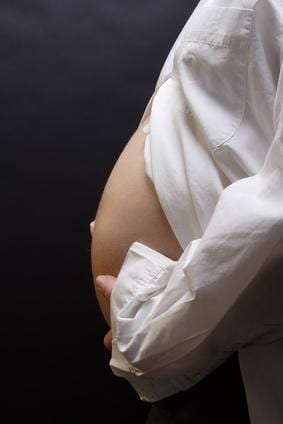In contrast to the feelings of elation many women experience when they find out they are pregnant is the fear of early labor. Early labor, also know as premature or preterm labor, occurs prior to 37 weeks gestation before the fetus is full term. According to the Centers for Disease Control and Prevention, one in 8 babies in the United States is born premature each year. Preterm birth is the leading cause of infant mortality, so it’s especially important to recognize its signs and symptoms.
Contractions
One of the most notable symptoms of preterm labor is contractions. When the uterus hardens and softens at regular intervals, the mouth of the cervix begins to open to allow the fetus to pass. When you have a contraction, your abdomen hardens for an average of 30 to 60 seconds and then softens. If you have a contraction every 10 or less minutes for at least an hour, there’s a chance you could be in preterm labor. Call your health care provider immediately so she can evaluate your condition. Unfortunately, many women experience Braxton-Hicks contractions, which tend to mirror true contractions. The main differences are that Braxton-Hicks contractions, which come in irregular intervals, do not change the opening of the cervix. Likewise, Braxton-Hicks contractions tend to go away if you lie down, change positions or drink a glass of water.
Leaking Fluid
It is not uncommon for women to experience some amount of leaking fluid during pregnancy, but distinguishing whether the leak is urine or amniotic fluid is essential. Dr. April Sarvis of the Beaumont Hospital in Royal Oak, Mich., says you should note how often and under what conditions you leak fluid. Later in pregnancy, many women leak urine when they cough, sneeze or laugh, due to increased pressure on the bladder. If the fluid looks and smells like urine, it most likely is. However, a constant trickle of fluid, or a gush of fluid when you stand, could indicate a rupture of membranes and requires immediate medical attention.
Discharge
As noted by the American Pregnancy Association, changes in the body during pregnancy increase the amount of discharge you might typically experience. Normal discharge appears thin, white and milky, and it has a mild smell. If you notice blood-tinged discharge that lasts longer than a day, and especially if it’s accompanied by abdominal cramping, call your health care provider.
Aches and Pains
As the uterus expands to accommodate the growing fetus, it puts a lot of strain on uterine ligaments and muscles. Although uncomfortable, this stretching sensation low in the abdomen is a completely normal symptom of pregnancy. It is most noticeable when you stand up or suddenly switch positions. You may also experience more backaches and a general feeling of heaviness in your pelvic region the closer to your due date you get. If any symptoms become severe or you experience them in addition to regular contractions or discharge, call your health care provider immediately as it can indicate labor.
Photo Credit
- pregnant women smells rose image by Olga Ekaterincheva from Fotolia.com





